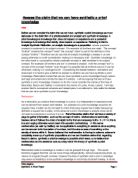Explain what is meant by the claim that the human mind starts as a tabula rasa and give one reason for holding this view.
Daryan Omar Philosophy
Explain what is meant by the claim that the human mind starts as a tabula rasa and give one reason for holding this view. [15 marks]
Tabula rasa is Latin for ‘blank slate’; this suggests that when one is born, his mind is vacant or void of any knowledge; it is hence an empty mind. Much like a white board is all at first, white and empty and is filled up with a pen, and here the mind is the whiteboard and the senses are the pen, filling up the brain.
Philosophers who hold this view are known as empiricists, famous empiricists include: John Locke, David Hume and George Berkeley. This tabula rasa concept can be scoured back to Aristotle, in his ‘On the soul (De Anima)’ which was the first time such a notion was presented as he talked of the ‘unscribed tablet’. This view was revived during 17th century Europe, John Locke, an Enlightenment thinker, wrote ‘An Essay Concerning Human Understanding’. In this essay, he wrote about the mind as a ‘white paper, void of all characters, without any ideas’. And this mind, where does it get this knowledge it is in possession of and Locke answered simply ‘experience’.








